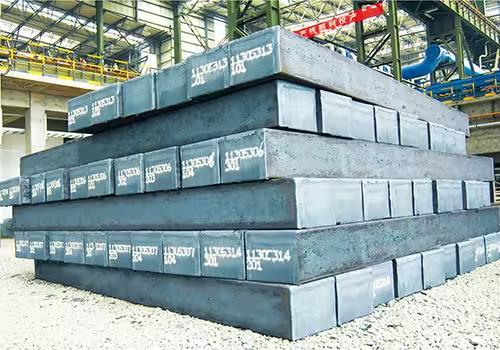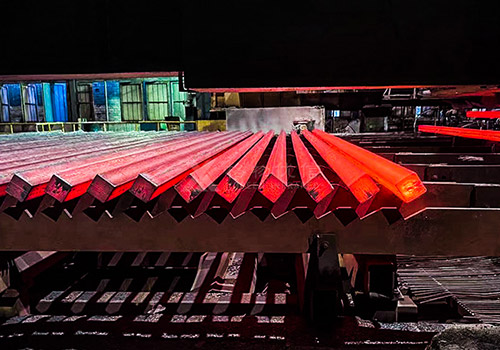
How to Choose the Right Billet Steel Block for Your Project
Introduction
Choosing the right billet steel block is a critical decision that can significantly impact the success of your project. Whether you’re involved in manufacturing, construction, or metalworking, the specifications of the billet steel block you select will influence the quality, durability, and performance of the final product. In this comprehensive guide, we will explore the factors to consider when choosing a billet steel block, how different specifications affect its properties, and practical tips for ensuring you make the right choice for your specific application.
Understanding Billet Steel Block

A billet steel block is a semi-finished steel product with a square or rectangular cross-section that is used as a raw material for producing a wide range of steel products. These blocks are created by continuous casting or hot rolling and are then further processed into bars, rods, wires, or structural shapes. The quality of the billet steel block plays a crucial role in determining the characteristics of the final product, making it essential to select the right type of billet for your project.
Key Factors to Consider When Choosing a Billet Steel Block
Selecting the right billet steel block requires careful consideration of several key factors. These include the composition of the steel, the size and shape of the billet, the manufacturing process, and the intended application. Understanding these factors will help you choose a billet steel block that meets your project’s requirements.
Steel Composition
The composition of the steel used in the billet is one of the most critical factors to consider. Billet steel blocks can be made from various types of steel, including carbon steel, alloy steel, and stainless steel. The specific alloying elements in the steel will determine its mechanical properties, such as strength, hardness, and corrosion resistance.
- Carbon Steel Billets: These billets contain a higher carbon content, which provides strength and hardness but reduces ductility. They are commonly used in construction and heavy-duty manufacturing.
- Alloy Steel Billets: Alloy steel billets include additional elements such as chromium, nickel, or vanadium, which enhance specific properties like toughness, wear resistance, or heat resistance. These billets are used in applications requiring enhanced mechanical performance.
- Stainless Steel Billets: Stainless steel billets have a high chromium content, providing excellent corrosion resistance. They are ideal for projects involving exposure to moisture, chemicals, or other corrosive environments.
Size and Shape
The size and shape of the billet steel block are important considerations, as they affect how the billet will be processed and what the final product will look like. Billets come in various sizes, typically ranging from small bars to large blocks. The size you choose will depend on the type of product you intend to manufacture and the capacity of your processing equipment.
- Small Billets: These are used for producing smaller components such as screws, bolts, or rods.
- Large Billets: These are suitable for creating larger structural elements like beams, columns, or heavy machinery parts.
Manufacturing Process
The manufacturing process used to produce the billet steel block can also impact its quality and suitability for different applications. Billets are typically produced through continuous casting or hot rolling.
- Continuous Casting: This method produces billets with a consistent cross-sectional area and is ideal for large-scale production.
- Hot Rolling: Hot rolling involves passing the steel through rollers at high temperatures, resulting in a billet with improved mechanical properties and surface finish.
Table: Comparison of Different Types of Billet Steel Blocks
| Specification | Carbon Steel Billets | Alloy Steel Billets | Stainless Steel Billets |
|---|---|---|---|
| Carbon Content (%) | 0.05% – 1.5% | 0.3% – 1.0% | 0.08% – 0.2% |
| Alloying Elements | None or minimal | Chromium, Nickel, etc. | Chromium (10.5% or more) |
| Corrosion Resistance | Low | Medium | High |
| Tensile Strength | Medium to High | High | Medium to High |
| Applications | Construction, machinery | Automotive, tools | Chemical, marine, medical |
Applications of Billet Steel Blocks
Billet steel blocks are used in a wide range of industries, and the specific type of billet you choose will depend on the intended application. Below are some common applications and the types of billet steel blocks best suited for each.
Construction and Infrastructure
In construction and infrastructure projects, carbon steel billets are often used due to their high strength and durability. These billets are ideal for producing structural components such as beams, columns, and reinforcement bars that require high load-bearing capacity.
Automotive and Machinery
Alloy steel billets are commonly used in the automotive and machinery industries. The added alloying elements provide enhanced mechanical properties, making these billets suitable for manufacturing gears, axles, crankshafts, and other components that need to withstand high stress and wear.
Chemical and Marine Applications
For applications that involve exposure to corrosive environments, stainless steel billets are the preferred choice. These billets are used to produce components for chemical processing equipment, marine vessels, and medical devices, where corrosion resistance is critical.
Practical Tips for Choosing the Right Billet Steel Block

When selecting a billet steel block for your project, there are several practical considerations to keep in mind. These tips will help ensure that you choose the right billet for your needs.
Evaluate Project Requirements
Before choosing a billet steel block, carefully evaluate the specific requirements of your project. Consider factors such as the mechanical properties needed, the environmental conditions the final product will be exposed to, and any industry standards or regulations that must be met.
Consider Processing Capabilities
Make sure that the size and shape of the billet you select are compatible with your processing equipment. If your equipment is not capable of handling large billets, opt for smaller billets that can be easily processed without compromising the quality of the final product.
Work with Reputable Suppliers
Partnering with reputable steel suppliers is essential to ensure that you receive high-quality billet steel blocks that meet your specifications. Look for suppliers with a proven track record in the industry and who can provide certification and documentation for the materials they supply.
Conclusion
Choosing the right billet steel block is a critical step in ensuring the success of your project. By understanding the different types of billets available, their composition, size, and the manufacturing processes used, you can make an informed decision that meets your project’s needs. Whether you are working in construction, automotive manufacturing, or chemical processing, selecting the appropriate billet steel block will ensure that your final product is of the highest quality and performance.
FAQ
What is a billet steel block?
A billet steel block is a semi-finished steel product with a square or rectangular cross-section that is used as raw material for producing various steel products.
What factors should I consider when choosing a billet steel block?
When choosing a billet steel block, consider factors such as steel composition, size and shape, manufacturing process, and the intended application of the final product.
How does the composition of a billet steel block affect its properties?
The composition, including carbon content and alloying elements, determines the mechanical properties of the billet, such as strength, hardness, and corrosion resistance.
What are the common applications of billet steel blocks?
Billet steel blocks are used in construction, automotive manufacturing, machinery, chemical processing, and marine applications, among others.
Why is it important to work with reputable suppliers when purchasing billet steel blocks?
Working with reputable suppliers ensures that you receive high-quality materials that meet your specifications and industry standards, which is crucial for the success of your project.






